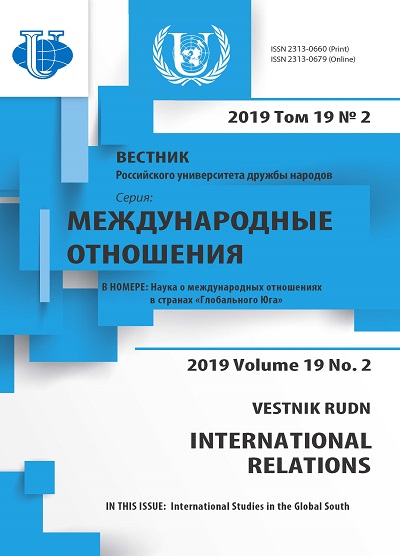Forced Migration in Sub-Saharan Africa
- Authors: Kommegni Fongang J.P.1
-
Affiliations:
- RUDN University
- Issue: Vol 19, No 2 (2019): International Studies in the Global South
- Pages: 264-273
- Section: PEACE AND SECURITY
- URL: https://journals.rudn.ru/international-relations/article/view/21464
- DOI: https://doi.org/10.22363/2313-0660-2019-19-2-264-273
Cite item
Full Text
Abstract
Migration is an important issue in modern international relations. This article discusses the characteristics of forced migration in Sub-Saharan Africa (SSA). Africa is a continent where migration has many species and actively influences the political situation in the countries of the continent. Migration in Africa is caused both by internal problems of the countries (political instability, famine, massacres, military conflicts, disturbance of public order, human rights violations) and external factors. All of these factors provoke mass population movements, forming new configurations of migration processes. At the same time, the fact that most of the migrants, moving to new places of residence, remain on the African continent is often ignored. Frequent causes of migration in Africa are economic factors: imbalances and uneven development, lack of employment opportunities, bad living conditions and low wages. At the same time, people migrate to Africa not only to improve their well-being. Military conflicts, threats to life or human rights violations are extremely common causes of forced migration in Africa. According to the Organization for Economic Cooperation and Development (OECD) (2018), more than 80 million Africans emigrated, leaving their country to settle permanently in another. The relevance of the article is due to the increase of forced migration volume in the SSA countries in 2000-2018 and the need to understand the reasons for this process. This article discusses forced migration in SSA countries. Based on the analysis, the main causes of forced migration in the SSA countries are identified, including political instability, famine, military conflicts, human rights violations, deterioration of socioeconomic conditions and the environmental problems in the countries of the region.
About the authors
Joaddan Prisca Kommegni Fongang
RUDN University
Author for correspondence.
Email: kprisca.lord@hotmail.com
post-graduate student of the Department of Theory and History of International Relations
Moscow, Russian FederationReferences
- Deych, T.L & Korendyasov, E.N. (Eds.). (2010). Africa and the World in the 21st Century. Moscow: Institute for African Studies publ. (In Russian).
- Deych, T.L & Korendyasov, E.N. (Eds.). (2016). New Partners of Africa: Impact on the Growth and Development of the Continent. Moscow: Institute for African Studies publ. (In Russian).
- Emelyanov, A.L. (2011). Colonial History of Sub-Saharan Africa. Moscow: MGIMO-University publ. (In Russian).
- Emelyanov, A.L. (2015). Imitating Democracy: African Version. Modern and Current History Journal, 5, 104—124. (In Russian).
- Emelyanov, A.L. (2017). Political Systems and Political Culture of the States of Africa. In: Is Non-Western Democracy Possible? A Russian Perspective / Ed. by A.D. Voskressenski. Singapore: World Scientific Publishing Co. P. 127—144.
- Esambu Matenda, G.J.B. (2018). Flux migratoires et émergence du fondamentalisme en Afrique Centrale. P.: L’Harmattan.
- Geveling, L.V. (2001). Socio-political Dimension of Corruption and a Negative Economy. The Struggle of the African State with the Destructive Forms of Power Organization. Moscow: Gumanitariy publ. (In Russian).
- Geveling, L.V. (2006). Tropical Africa: the Development of Transitional Forms of Organization of Power. In: Lomonosov Readings. Orientalism: Scientific Conference, April 2006: Abstracts of Reports. Moscow: Akademiya gumanitarnykh issledovaniy publ. P. 386—390. (In Russian).
- Geveling, L.V. (2011). Elections in Nigeria: Time of Political Paradoxes. Asia and Africa Today, 8 (649), 37—44. (In Russian).
- Geveling, L.V. (2012). Foreign Experience in the Fight against Corruption: the Federal Republic of Nigeria. Analytical Bulletin of the Council of Federation of the Federal Assembly of the Russian Federation. Series: National Security Issues, 10 (453), 39—53. (In Russian).
- Geveling, L.V. (2013a). Independent Nigeria. In: Nigeria. Monograph reference book. Moscow: Institute for African Studies publ. P. 70—123. (In Russian).
- Geveling, L.V. (2013b). Nigerian Anti-Corruption Model. In: Nigeria. Monograph reference book. Moscow: Institute for African Studies publ. P. 253—260. (In Russian).
- Geveling, L.V. (2013c). Fourth Republic in Nigeria: A Chronicle of Political Violence. In: Conflicts in Africa: Causes, Genesis and Settlement Problems (Ethnopolitical and Social Aspects). Moscow: Institute for African Studies publ. P. 147—173. (In Russian).
- Gromoglasova, E.S. (2018). Humanitarian Component of a State’s Foreign Policy. Pathways to Peace and Security, 1 (54). Special Issue: Humanitarian Challenges, Humanitarian Support and Human Protection in Armed Conflicts / Ed. by E.A. Stepanova. P. 77—91. doi: 10.20542/2307-1494-2018-1-77-91. (In Russian).
- Korendyasov, E.N. (2015). Migration in Africa: Foreign Policy Aspects. In: African Migration in the Context of Contemporary International Relations: Collected Articles / Ed. by T.L. Deych, E.N. Korendyasov. Moscow: Institute for African Studies publ. P. 7—28. (In Russian).
- Lebedeva, E.E. (2009). Migration Policy of Sub-Saharan Africa. Migration Processes in Asia and Africa. In: State Experience: Collected Articles / Ed. by A.A. Rogozhin. Moscow: IMEMO RAN publ. P. 40—52. (In Russian).
- Naumkin, V.V. (2011). Ethnopolitical Conflicts in the Contemporary World. Moscow: Nauka publ. (In Russian).
- Osminina, M.A. & Smirnova, O.A. (2010). Analysis of the Unstable Situation on the African Continent: A Comparative Analysis and Characteristics. Modern Society’s System of Values, 14, 142—147. (In Russian).
- Tandonnet, M. (2002). Immigration Policy in France and the Problem of Illegal Migration. In: Western Immigration Policies: Alternatives for Russia / Ed. by G.S. Vitkovskaya. Moscow: Gendalf publ. P. 204—212. (In Russian).
- Tatarintsev, V.M. (2012). Africa: the Present and the Future. Moscow: Vostochnaya kniga publ. (In Russian).
- Vasiliev, A.M. (2012). Africa and the Challenges of the 21st Century. Moscow: Nauka publ. (In Russian).
- Yurtaev, V.I. & Ndakissa Onkassa, F.C. (2017). The Diplomacy of Lesser African Countries: The Experience of Gabon. In: Africa: Sustainable Development and the Diplomacy of Dialogue: Yearbook—2017 / Ed. by N.S. Kirabaev, L.V. Ponomarenko, V.I. Yurtaev, E.A. Dolginov. Moscow: RUDN publ. P. 152—164. (In Russian).











